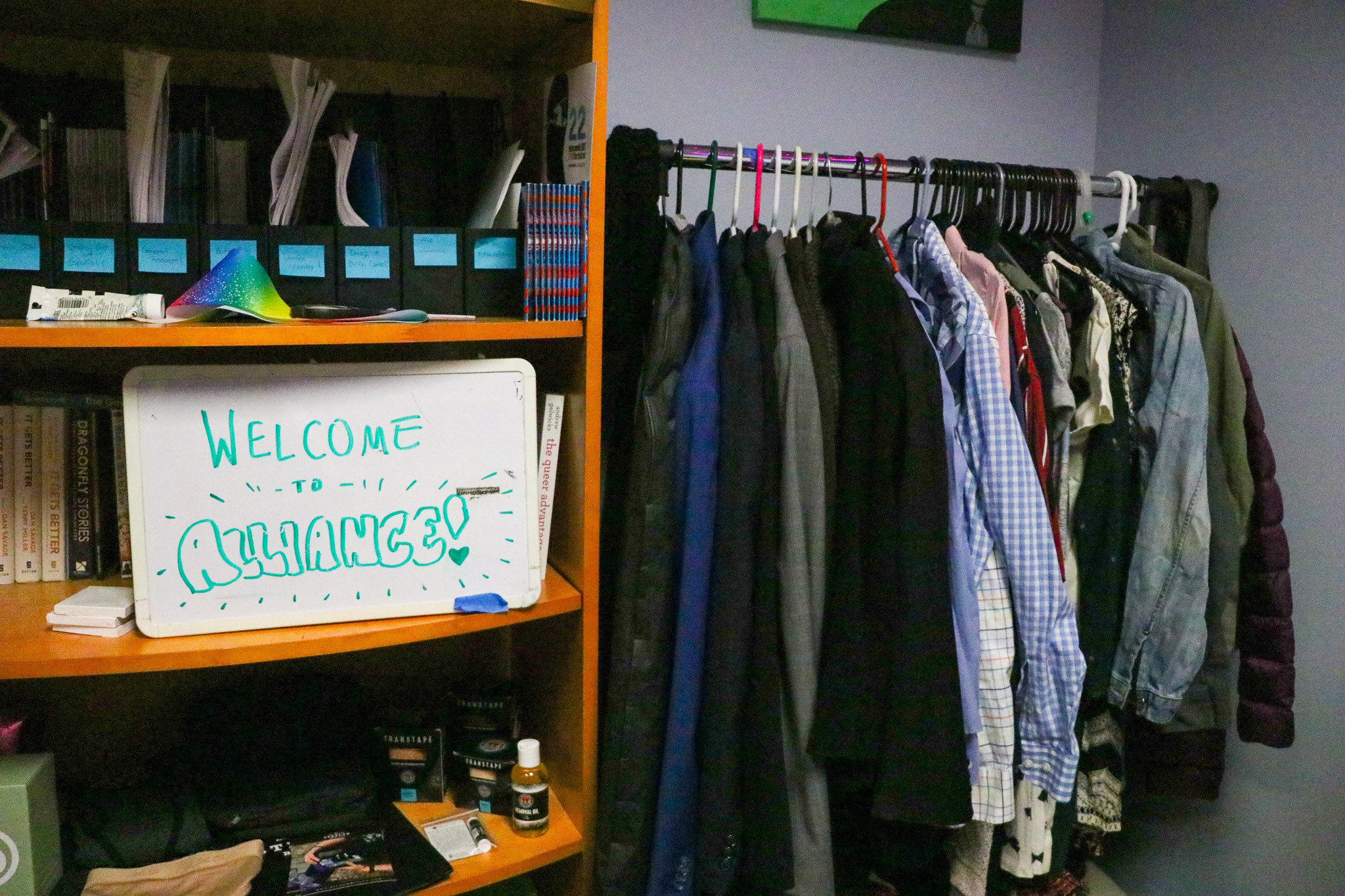The Gender Affirmation Closet is located in the Diversity Center in Atherton Union. Photo by Natalie Goo.
OLLIE FITZGERALD | STAFF REPORTER | ofitzgerald@butler.edu
Students on campus who are looking for resources to present their gender and identity now have a safe space on campus to find them. The Gender Affirmation Closet (GAC) is sponsored by the university’s LGBTQIA+ Alliance, or Alliance, and follows in the footsteps of initiatives from several other universities including the University of California, Davis and the University of Nebraska.
The GAC at Butler began its conception in 2021. According to Alliance’s GAC information sheet, the closet self-identifies as “a place where transgender, non-binary, and gender-nonconforming students can go for identity-affirming clothing and accessories.” This includes items like binders, packers and trans tape.
The GAC can be accessed by completing a form on the Alliance Instagram. This form allows students to advocate for their needs and schedule a time to look at items, including stereotypically-gendered clothes and accessories, found in the closet.
The GAC is funded by Butler Student Government Association grants but relies highly on donations from students and alumni for items like clothing, accessories, chest binders, packers and trans tape. This allows transgender students to access items that make them feel more comfortable in their identity.
Ashleigh Michaels is a senior English major and the secretary of Alliance. She explained that Diversity Center staff are present in the Diversity Center to help all students look at and find items in the closet.
“It’s important for trans people to feel safe and comfortable in their bodies, and however we can help with that is fantastic,” Michaels said.
Students can even schedule a preliminary look at the GAC so they can try on sizes, or see what the closet has to offer. Alliance keeps track of all items they have, and what they are giving away.
“If somebody wants to come in and say, ‘Hey, I want to look at the selection of skirts you have,’ we’ll be there to help them find something that fits,” Michaels said.
Mikala Lain, assistant director of the Diversity Center, explained that there are different sizes and colors of items for students to try on and see what they are looking for, but the process can be personalized to make each student feel affirmed. Alliance will also custom order sizes if a student is looking for a specific size and color of an item.
“We have some of the samples that we keep in stock that students can just walk away with right then and there,” Lain said. “Then the rest of it, we custom order for each student.”
Accessing gender-affirming items on campus is important to transgender students, especially following the passing of Senate Bill 480, which bans gender-affirming healthcare to state residents under the age of 18.
Governor Eric Holcomb signed the bill into law in April 2023 and was met with resistance from the American Academy of Pediatrics and the American Civil Liberties Union. The bill was temporarily blocked by both organizations until late February 2024. The block was then lifted, allowing the bill to go into immediate effect. Senate Bill 480 bans doctors from providing minors with gender-transitioning surgeries, hormone treatments and puberty blockers.
According to a study from the Trevor Project, a nonprofit that focuses on suicide prevention within the LGBTQIA+ community, in 2022, 19% of transgender youth, 13-24 years, in Indiana attempted suicide. 54% of transgender youth heavily considered suicide.
A series of studies that evaluated suicide-related outcomes following gender-affirming care found that the majority of transgender people reported a reduction in suicidal tendencies following gender-affirming care. Without access to gender-affirming healthcare, access to gender-affirming items like the GAC provides could be the difference between life and death for transgender youth.
Emi Rosen is a sophomore English major and vice president of programming and events for Alliance. She has been heavily involved in the creation of the GAC and empathizes with students who are seeking gender-affirming health care.
“Having gone through that experience of searching for things that I need and doing all the research, it’s important to me to share [research and guidance] with everyone else who needs it and save them a few steps and some money and comfort,” Rosen said.
Rosen also discussed how the GAC is important for Butler’s community as a whole, as the completion of the GAC spreads more awareness about Alliance, a club that aims to spread messages of equality around campus. It also provides a resource for students who have not had the opportunity or financial capability to affirm themselves and their identities.
“For people who might be questioning their gender or sexuality, or just however they feel about themselves, if this is the first time they’ve heard about that, then [we’d] love to be the group of people to kickstart somebody’s gender identity journey and make that easier for them,” Rosen said.



